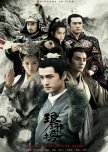This review may contain spoilers
A brilliant masterpiece
This is one of the best TV dramas I've watched, up there with Sherlock, Wolf Hall and The Crown. More thought-provoking and less violent with hardly any sex scenes, I much prefer this to Game of Thrones. The story, writing, direction, acting, music, cinematography and over-all production are top-notch.
Hu Ge is flawless as political strategist Mei Changsu/Su Zhe who is bent on restoring his family's honor as well as those of his much-admired cousin Prince Qi and 70,000 soldiers of the Chiyan Army who were wrongfully accused of rebellion thirteen years ago. The rest of the characters, notably Prince Jingyan (Wang Kai), Duchess Mu Nihuang (Liu Tao), the Emperor of Great Liang (Ding Yong Dai) and Mei Changsu's young but capable bodyguard Fei Liu (Leo Wu), are as compelling. Watching Mei Changsu navigate the political arena in the imperial court is like watching a grandmaster playing chess. His metamorphosis from vibrant young marshal Lin Shu to a frail, soft-spoken but formidable strategist unrelenting in his search for justice is awe-inspiring but heart-breaking as well, such that even just hearing the beautiful opening and ending themes makes me tear up.
The first few times I watched the opening sequence, I was underwhelmed, wishing that, in addition to butterfly wings, there were also dramatic images of people to complement the stunning music. Then I realized there ARE human forms, I just had to be more observant. Turns out, the opening sequence is more beautiful than I could imagine. Since then, every time I watch it, I would try to find more hidden images, much like discovering forms in clouds. Another delightful feature is the original dialogue that I understand is poetic, making me want to learn Mandarin. These easter eggs show how meticulously crafted this gem is.
The emotional impact is not forced but grabs the viewers organically, from the story, acting, music and other elements that subtly add to the power of each scene. I cried almost the whole finale episode, even though there were hardly overly dramatic scenes. In fact, I think it's because the emotional expressions are muted that I felt the urge to release pent-up emotions. Even now, I still tear up whenever I remember the scene where Lin Shu bowed and silently wept in his family's ancestral hall after he successfully restored the family's honor.
It is a testament to the brilliance of the storytelling that a sucker for happily-ever-after endings like myself cannot fault the ending. While a fully fairytale ending would have been inconsistent with the tone of the story, this may be considered as having a happy ending, one that Mei Changsu/Su Zhe/Lin Shu would have approved of, having been able to give his all in the service of truth, justice and country.
Hu Ge is flawless as political strategist Mei Changsu/Su Zhe who is bent on restoring his family's honor as well as those of his much-admired cousin Prince Qi and 70,000 soldiers of the Chiyan Army who were wrongfully accused of rebellion thirteen years ago. The rest of the characters, notably Prince Jingyan (Wang Kai), Duchess Mu Nihuang (Liu Tao), the Emperor of Great Liang (Ding Yong Dai) and Mei Changsu's young but capable bodyguard Fei Liu (Leo Wu), are as compelling. Watching Mei Changsu navigate the political arena in the imperial court is like watching a grandmaster playing chess. His metamorphosis from vibrant young marshal Lin Shu to a frail, soft-spoken but formidable strategist unrelenting in his search for justice is awe-inspiring but heart-breaking as well, such that even just hearing the beautiful opening and ending themes makes me tear up.
The first few times I watched the opening sequence, I was underwhelmed, wishing that, in addition to butterfly wings, there were also dramatic images of people to complement the stunning music. Then I realized there ARE human forms, I just had to be more observant. Turns out, the opening sequence is more beautiful than I could imagine. Since then, every time I watch it, I would try to find more hidden images, much like discovering forms in clouds. Another delightful feature is the original dialogue that I understand is poetic, making me want to learn Mandarin. These easter eggs show how meticulously crafted this gem is.
The emotional impact is not forced but grabs the viewers organically, from the story, acting, music and other elements that subtly add to the power of each scene. I cried almost the whole finale episode, even though there were hardly overly dramatic scenes. In fact, I think it's because the emotional expressions are muted that I felt the urge to release pent-up emotions. Even now, I still tear up whenever I remember the scene where Lin Shu bowed and silently wept in his family's ancestral hall after he successfully restored the family's honor.
It is a testament to the brilliance of the storytelling that a sucker for happily-ever-after endings like myself cannot fault the ending. While a fully fairytale ending would have been inconsistent with the tone of the story, this may be considered as having a happy ending, one that Mei Changsu/Su Zhe/Lin Shu would have approved of, having been able to give his all in the service of truth, justice and country.
Was this review helpful to you?













